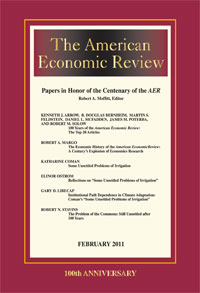Rock and Roll Bands: (In)Complete Contracts and Creativity
Members of a rock and roll band are endowed with different amounts of creativity. They come together (match), compose songs, and share credit and royalties for their compositions. The presence of more creative members increases the probability that the band will succeed, but those more creative members may also claim a larger share of the pie. In our theoretical model, the nature of matching (postive or negative assortative) as well as the covariation between the probability of having a hit and the allocation (dispersion) of credit among individual members are a function of the completeness of contracting. When members adopt a “gentleman’s agreement” to share credit equally, the covariation between the probability of a hit and the dispersion of credit is negative–the consequence of positive assortative matching in creativity. The data show that the relation between dispersion and success is significantly negative. In other words, rock bands tend to enter into incomplete contracts.

